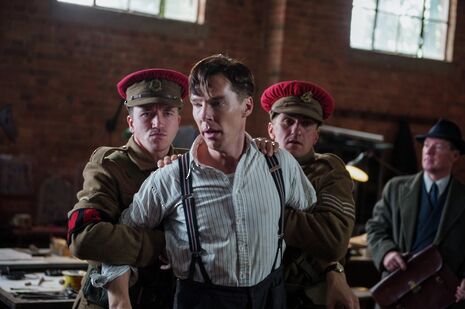Film: The Imitation Game
Elissa Foord is impressed by this poignant and gripping film

The Imitation Game opens on a note of familiarity to a Cambridge audience: in a one-on-one, a King’s maths professor begins an answer with the words, “are you paying attention?” But, sitting in a police cell, facing charges of ‘gross indecency,’ the man who broke the Enigma code is a world away from the shelter of Cambridge, and the tale that he unfolds is one of the most extraordinary stories of the twentieth century.
As we are shown Alan Turing’s experience of World War Two – for him, a war against the clock – director Morten Tyldum delivers an engrossing thriller: we are never allowed to forget the immensity of the task, the millions of distant soldiers whose lives hang in the balance, or the mounting time pressure. Yet the flashback structure ensures that the tragedy of his persecution as a homosexual after the war is ever-present, and his consequent suicide is foreshadowed from the very offset.
Benedict Cumberbatch delivers the performance of his career as the film explores Turing’s enigmatic character, supported by a bold script. To begin with, the film struggles to differentiate its portrayal of its central genius from the John Nash of A Beautiful Mind. Yet, as it brings out the painful irony of a master code-breaker unable to decipher human interaction, and the romantic dynamic that develops between Turing and his machine, Christopher, named after Turing’s deceased childhood love, it constructs an intricate and moving portrait of the complexities of this “odd duck.”
Impressive, too, were Keira Knightley, in her lively portrayal of fellow code-breaker Joan Clarke, a role that risked falling into caricature, and Mark Strong, as Machiavellian MI6 boss Stewart Menzies. Alex Lawther, who plays Turing in a series of flashbacks to his schooldays, is also a promising talent.
Inevitably for a biopic, the film has drawn criticism for historical inaccuracies and innovations, but, to me, this never went beyond the remit of artistic licence. Over the final scenes are superimposed some last details of Turing’s story: that his work curtailed the War by at least two years, saving 14 million lives; that it was kept secret for fifty years, and only revealed after his condemnation to chemical castration, and suicide; that he was only pardoned in 2013.
My emerging feeling was one of shock: shock that I had lived through 18 years during which Alan Turing remained unpardoned, when it was not a pardon that he deserved, but an apology; shock that The Imitation Game brings home in a work that, at once poignant, humorous, gripping, and exploratory, reflects the complexity of its subject.
 Comment / Plastic pubs: the problem with Cambridge alehouses 5 January 2026
Comment / Plastic pubs: the problem with Cambridge alehouses 5 January 2026 News / Cambridge businesses concerned infrastructure delays will hurt growth5 January 2026
News / Cambridge businesses concerned infrastructure delays will hurt growth5 January 2026 News / Cambridge academics stand out in King’s 2026 Honours List2 January 2026
News / Cambridge academics stand out in King’s 2026 Honours List2 January 2026 News / AstraZeneca sues for £32 million over faulty construction at Cambridge Campus31 December 2025
News / AstraZeneca sues for £32 million over faulty construction at Cambridge Campus31 December 2025 Interviews / You don’t need to peak at Cambridge, says Robin Harding31 December 2025
Interviews / You don’t need to peak at Cambridge, says Robin Harding31 December 2025









